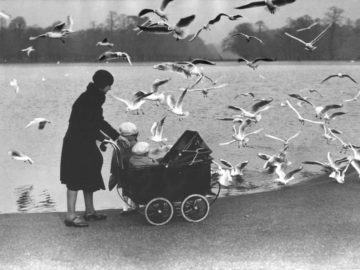Ceri Radford in The Independent:
 Given that literature thrives on probing difficult but defining experiences, you would expect the shelves of the canon to creak with the weight of great writers exploring motherhood. After all, what is a tricky love affair compared to expelling a new human being from your body and keeping it alive as it goes from helpless blob to something capable of sarcasm and quadratic equations? Surely there can be few greater fuels for writing than the bubbling brew of love and loss that goes with the transition from being a free, autonomous person to someone who can’t go to the toilet in peace. So where are all the books?
Given that literature thrives on probing difficult but defining experiences, you would expect the shelves of the canon to creak with the weight of great writers exploring motherhood. After all, what is a tricky love affair compared to expelling a new human being from your body and keeping it alive as it goes from helpless blob to something capable of sarcasm and quadratic equations? Surely there can be few greater fuels for writing than the bubbling brew of love and loss that goes with the transition from being a free, autonomous person to someone who can’t go to the toilet in peace. So where are all the books?
The answer is that they’re mostly missing in action, because the canon has not only long marginalised women, but in a more subtle way trivialised anything connected with the female experience. As Rachel Cusk – one of those notable exceptions – put it, there’s a “gloomy suspicion that a book about motherhood is of no real interest to anyone except mothers”.
It’s the same old problem: male experience is taken as universal, female as niche. Thankfully, things are changing, as a powerful anthology, The Best Most Awful Job: Twenty Writers Talk Honestly About Motherhood, edited by Katherine May, demonstrates. Released in time for Mother’s Day, it’s part of a trend that provides the perfect backlash to that pastel-toned parade of bouquet-buying. From the firehose of frank and often hilarious grievances that is Mumsnet to memoirs like Meaghan O’Connell’s And Now We Have Everything, women are finally opening up about the relentlessness and resentments that are as much a part of motherhood as elastic-topped jeans.
As someone who feels like the onset of parenthood would be documented as a human rights abuse had it occurred in any other sphere (wait, I just lost two nights in labour, then had an emergency C section, then instead of resting after a major op, I won’t sleep five straight hours for the next… six months?), I’m delighted by this new trend. If I had added a Post-it Note to every sentence in this book that made me laugh, wince in recognition, or faintly well up, I would have turned it into a paper porcupine.
More here.
